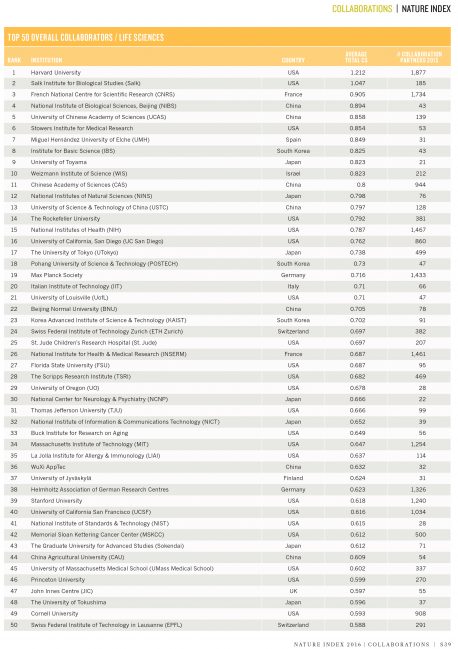
November 17, 2016
Global indicator of high-quality research tallies most fruitful scientific collaborations
Global indicator of high-quality research tallies most fruitful scientific collaborations
LA JOLLA—(November 17, 2016) The Salk Institute ranks second in the world for high-quality, high-impact scientific collaborations in the life sciences, and in the top 50 for both overall collaboration and bilateral collaboration, according to a new report by Nature Research.

Click here for a high-resolution image.
Credit: Nature Research
The data, publishing November 16, 2016 as a supplement to Nature in a report called Nature Index 2016 Collaborations, use a series of metrics related to papers published between January 1, 2012 and December 31, 2015 to evaluate over 8,500 scientific institutions across the globe. The index, designed to be a tool for assessing research performance, charts which countries and institutions are the most efficient at producing high-quality results based on publications in top-tier journals.
“The strength of the Salk Institute’s collaborations in the life sciences is commendable. The institute placed second in the world in the table of top collaborators in that field,” says Richard Hughes, publishing director of Nature Research. “This performance follows a marked increase in the institute’s output of high-quality papers between 2012 and 2015, which saw it listed as one of Nature Index’s 25 ‘rising stars’ in North America this year.”
Salk was ranked second worldwide, behind only Harvard, in a list of the top 50 overall collaborators to the life sciences based on a ratio of collaborations to institution size. Salk also ranked number 47 on the list of the top 100 bilateral contributors, and number 50 on the list of top 100 overall collaborators worldwide.
“Our reputation for encouraging collaboration is one of the main reasons top scientists choose to come to Salk,” says Salk President Elizabeth Blackburn. “We are delighted to have our researchers’ generosity of spirit and commitment to excellence recognized in Nature Index.”
Since its inception, the Salk Institute has focused on providing its scientists the flexibility and infrastructure to collaborate across fields and across institutions, knowing that such intellectual crossovers can spark remarkable discoveries. The Institute’s unique collaborative infrastructure, cutting-edge technologies and world-class talents enable ambitious inroads in pursuing solutions to some of the world’s most pressing health problems. From cancer and diabetes to Alzheimer’s and autism, Salk scientists are making biomedical advances to help enable people to live longer, healthier lives. And for a planet stressed by drought and climate change, Salk researchers are discovering how to make plants—especially food crops—live longer, healthier lives too. As Salk has shown time and again, collaborations across institutes and across scientific fields pave the way for new discoveries.
First launched in November 2014, the Nature Index database tracks the author affiliations of research articles published in a group of 68 high-quality natural science journals, which have been selected by independent panels of active scientists. Responses from over 2,800 individuals to a large-scale survey were used to validate the selections.
The Nature Index uses three counts of article output: article count (AC), which assigns a rank of one for each article that has at least one author from that institute; fractional count (FC), which takes into account the relative contribution of each author to an article; and weighted fractional count (WFC), which applies a weighting to fractional count to adjust for the overrepresentation of papers from astronomy and astrophysics.
Office of Communications
Tel: (858) 453-4100
press@salk.edu
Unlocking the secrets of life itself is the driving force behind the Salk Institute. Our team of world-class, award-winning scientists pushes the boundaries of knowledge in areas such as neuroscience, cancer research, aging, immunobiology, plant biology, computational biology and more. Founded by Jonas Salk, developer of the first safe and effective polio vaccine, the Institute is an independent, nonprofit research organization and architectural landmark: small by choice, intimate by nature, and fearless in the face of any challenge.